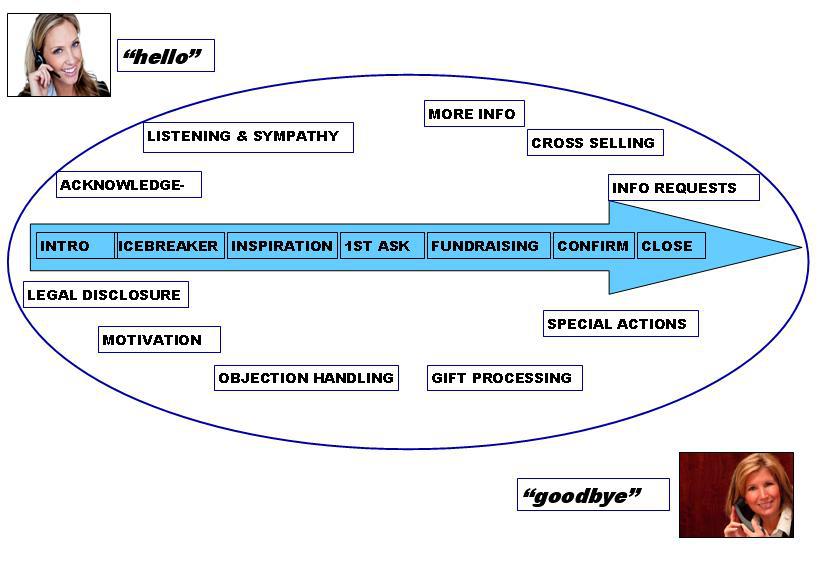Telephone fundraising, part 3: designing and delivering a campaign
- Written by
- Bethan Holloway
- Added
- April 15, 2013
If you’ve read parts one and two you’ll already have a good understanding of why the phone is a great fundraising tool and how it can be used to drive the performance of almost any fundraising programme. Tailoring the campaign to specific objectives, audience, cause and opportunity is key to success and the following is a great starting point for planning your agenda.
Audience

Before you plan any details take time out to think about your audience. Think about the donor profile, how they have supported you to date, why they supported you and their connection to the cause. Also, think about what you are going to ask of them and how they might respond to that request – what barriers might they have to giving? And what else might come up during the conversation: topical news, complaints, requests for information?
Only then you can design an approach or write a script with your supporters in mind, choose a subject matter that they will connect with, devise an ask that is appropriate to the level and type of support they have given before and personalise the conversation.
Approach
Now plan your approach, from hello to goodbye.
How closely you ask the fundraisers to stick to a script should depend on their experience, knowledge of the subject matter, how particular you are and how careful you need to be around wording and messaging. Regardless, having a script of some sort is crucial – it gives your fundraisers a ‘pathway’ through the conversation. By the very nature of conversation, you can’t script everything, nor would you want to, but a good script will allow the fundraisers to weave seamlessly between supporter interaction and meeting the objective of the call, whilst dealing with any barriers to giving along the way.

Introduction
Build rapport, make it warm, friendly, reinforce any existing relationship.
Ice-breaker
Open up the conversation and encourage interaction, gauge the donor’s levels of interest and ‘warmth’. The fundraiser should be trained to tailor and personalise the call based on this initial interaction.
Inspiration
This is where your story comes in, where you build your case for giving and inspire supporters to want to give
First ask
Be confident and direct in what you are asking for and where possible demonstrate impact through use of tangibles ‘Can you give £5 to vaccinate and save the lives of five children?’ Link the impact back to the beneficiary, not the organisation’s needs.
The fundraising
Not everyone will say yes at the first ask – the important thing is to listen to why they say no, demonstrate you have listened and then suggest something more suitable to them. This is one of the amazing things about the phone – the ability to deliver a truly tailored ask to every supporter

Confirmation
Be clear on what the supporter has agreed to do and what will happen next.
Close
Ensure appropriate levels of thanks and warmth are used, especially to those that have chosen not to give. Supporters should never be left feeling guilty – they should feel more positive about the charity having received the call if they are to remain supporters.
Your fundraisers
Some of the most important qualities we look for when recruiting fundraisers are maturity, empathy, shared values, conversational competence and listening skills.
Do not underestimate the importance of briefing your fundraisers. Focus on inspiring and motivating the team and be wary of ‘information overload’. Try to restrict yourself to covering only the things that will help them make a good call and remember it is okay not to know the answer to every supporter’s question, but it is not okay to make dispassionate, impersonal calls.
Campaign management
Use benchmarking to ensure that you are aiming to raise as much money as possible, but that your targets are realistic. It is tempting to be overly optimistic and challenge your fundraising teams to achieve more, but an unachievable target will have a negative impact on the team’s morale, jeopardise the supporter’s experience and ensure your campaign manager is unable to manage effectively. A true relationship fundraiser will also measure the impact a phone conversation has on attrition, future giving, donor satisfaction and lifetime value.
When setting targets think about setting them foraverage call lengths, or how many calls you expect each fundraiser to make in an hour or a shift. This will help you plan and manage resource levels and budgets.
Be clear on your expectations and how you are going to measure call quality. Listen to calls and feedback to fundraisers often.
Data
As with all direct marketing, data is the key. On a typical fundraising campaign ‘recency, frequency, value’ and, finally, ‘tenure’ (time on the file) are commonly used to drive selection and segmentation hierarchies. Generally, the more recently and frequently a donor has donated/petitioned/participated/sent a text/enquired the higher the response rate you can expect. When looking at previous giving behaviour it is particularly useful to look at response to any previous telephone asks – each historical refusal decreases the likelihood of someone saying yes this time.
Recruitment source or channel will often have an impact on results too – look at this particularly if you use a diverse range of channels for recruitment or if you are calling recently recruited supporters. In addition to this, those that have given you their credit card details before are more likely to give their bank details over the phone and, therefore, achieve higher response rates. Equally, people signing up to Gift Aid are more likely to have a stable income and so give support with a regular gift.
Other things to think about
This is already a fairly long article, at the end of a three-part series, so I will wrap up in the acknowledgement that I have overlooked the processing of gifts, data returns, post-call fulfilment letters and emails, legal disclosures and opt-ins, telephone-number tracing or post-campaign analysis and review. All important things but details best saved for those seriously thinking about running their first telephone campaign without the help of a professional fundraising agency. If that's you, why not leave your details below or email Rebecca on rpatterson@pellandbales.co.uk for a free copy of our Telephone Fundraising for Dummies guide. And good luck – we’d love to hear how you get on and if you found this series useful.
So that’s it. In a nutshell a three-part, whistle-stop guide on what to think about when you are using the phone to fundraise.


















